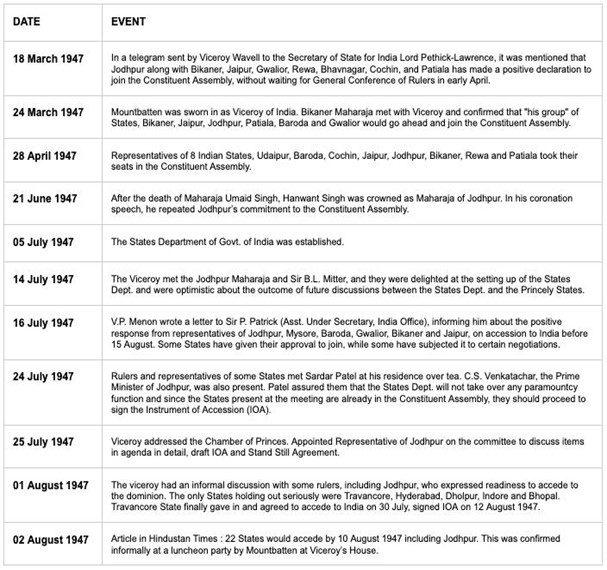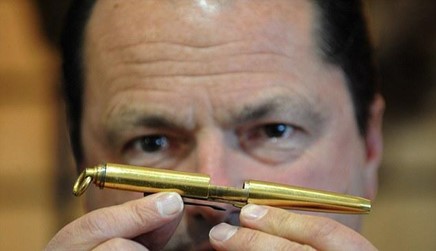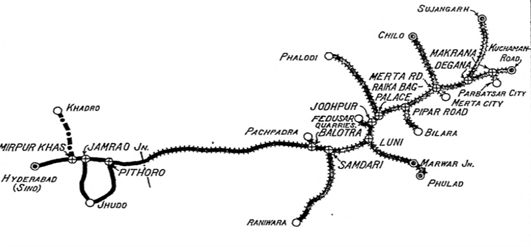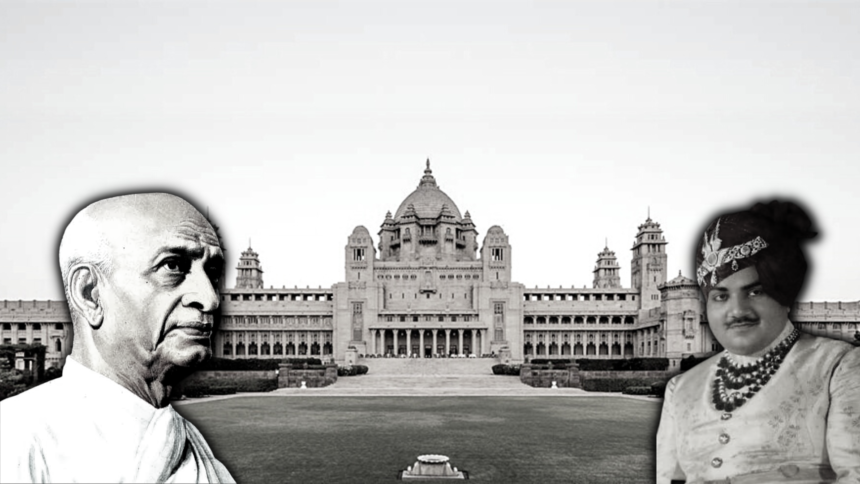It is widely known that in 1947, there were a few States which were not ready to join the Union of India. Hyderabad, Junagarh, Indore, and Bhopal were the most common names. Later, in many books and articles, it was written that the young Maharaja of Jodhpur wanted to join Pakistan, but he was persuaded by many people not to join Pakistan, and finally, he joined India. Many writers have written their own versions of the story, with some creating stories that are so far from the truth that they are no less than fiction.
One of the first authors who wrote this story was V.P. Menon, in his book “The Story of the Integration of the Indian States”. Later, many other writers wrote their own stories about Jodhpur’s accession to India, which one can see in various books and many articles frequently repeating the same myth. Except for Late Sh. Onkar Singh, we don’t have many who challenged this story by Menon.
Let’s separate the facts from the fiction in this story. First, we should revisit the short timeline of a few months before India’s independence, mainly related to Jodhpur.

Did Jodhpur Want To Merge With Pakistan?
This is a very popular belief that Jodhpur wanted to accede to Pakistan, but with the efforts of V.P. Menon, Sardar Patel, and Mountbatten, it didn’t happen. This story with different versions has been written by many authors, especially V.P. Menon, D.R. Mankekar, K.M. Panikkar, and the authors of Freedom at Midnight, The Last Days of British Raj, and The Great Divide. One important thing missing among these different stories is the timeline in which these events took place.
Menon has mentioned that Maharaja had a series of meetings with Jinnah and as soon as he [Menon] came to know about these meetings, he got hold of him at Delhi (3 days after the meeting with Jinnah) and took him to Viceroy and explained the situation to Viceroy, who in turn explained to Maharaja why Jodhpur should not merge with Pakistan. Menon also mentioned that the Maharaja started asking for impossible concessions, which were flatly refused by Menon. After a great deal of discussion, Menon gave him a letter conceding to his demands. After signing the IOA, when Mountbatten went out of the room, Maharaja pointed his revolver at Menon’s head saying “I refuse to accept your dictation.” Menon admonished him, saying, “Don’t indulge in juvenile theatricals.” When Mountbatten returned, Menon told this to him. Mountbatten made light of the episode and turned it to jest. Maharaja returned to normal, and they departed in the company.[Menon,p 116-117]
Other writers have written their story around the same premise, but they also add their own imaginations by altering the facts and making an issue entirely out of a non-issue, just as Menon did. Since all other stories are more or less based on Menon’s story, let’s examine Menon’s story with the detailed chronological events mentioned in Transfer of Power, Vol. 12. The Nawab of Bhopal had provided a first-hand account of this meeting of 06 August to Viceroy Mountbatten on 11 August 1947, the day Jodhpur signed the IOA with the Union of India.
06 August 1947, Wednesday – The Nawab of Bhopal was informed that Jodhpur Maharaja Hanwant Singh wanted to meet him. Maharaja met Nawab at his residence and enquired if Nawab could arrange his meeting with Jinnah as quickly as possible, to which Nawab said he already had a meeting arranged with Jinnah that afternoon and since Jinnah was busy on the eve of his departure from India, Maharaja could come along with him to see Jinnah. They drove together to Jinnah’s house. During the interview, Maharaja asked Jinnah, “What are the terms he is offering to the States who wish to establish a relationship with Pakistan?” To which Jinnah replied, “I have made my position very clear, we are ready to come to treaty relations with the States, and we shall give them very good terms, and we shall treat them as Independent States.” They then discussed certain details about port facilities, railway jurisdiction, and the supply of food, arms, and ammunition. The question of whether he should or should not sign the IOA never arose. Nawab then returned to Bhopal, where he was informed that Maharaja was returning to Delhi on Saturday and will meet the Nawab on Saturday.[TOP, p660-661]
Unlike Menon’s and Panikkar’s claims, the Maharaja never had any earlier meetings with Jinnah. This meeting, on 06 August, was their first and last meeting. If the Maharaja had met Jinnah earlier or was in discussion with him, he wouldn’t need the help from the Nawab to arrange his meeting or ask Jinnah about Pakistan’s proposed terms to the Princely States. In fact, Maharaja had already confirmed his agreement to join the Union of India twice (16 July and 01 August, as shown above) and unlike Hyderabad, Bhopal, Travancore, Indore, and Dholpur, Jodhpur State was one of the first States to join the Constituent Assembly in April 1947.
It is also evident that Maharaja’s meeting with Jinnah wasn’t a scheduled one, but the Bhopal Nawab asked Maharaja to join him since Nawab already had an appointment with Jinnah on the eve of his departure to Karachi. It is also clear that there was no discussion about joining Pakistan or not signing IOA with India. Jinnah neither offered any blank sheet of paper to Maharaja to write his own terms[Menon,p116][Last Days,p177][AtoE, p110] nor did Jinnah offer Maharaja suzerainty of all Rajasthan, as claimed by Panikkar.[Panikkar,p164] Rajasthan as a Union of Princely States did not exist at that time, so how could Jinnah offer suzerainty of non-existent Rajasthan to the Maharaja? Rajasthan Union was formed in March 1948 and Jodhpur joined Greater Rajasthan in 1949.
The entire narrative of Jodhpur wanting to join Pakistan is based on this meeting of 06 August alone. By the account of the Bhopal Nawab, who was present in this meeting, it is confirmed that this meeting was neither a scheduled one nor was the Maharaja given an offer to join Pakistan. The details which were enquired about by Maharaja were the crucial needs for the State of Jodhpur and weren’t of any personal gain to Maharaja himself. Moreover, this meeting helped Maharaja to get all his demands accepted by the States Department quickly.
It should be noted that the Maharaja of Indore had written a letter to Jinnah on 09 August 1947, asking for a copy of the terms offered to the States which might wish to accede to Pakistan, as those terms would be helpful in his negotiation with the States Department. The Indore Maharaja also wrote that the Nawab of Bhopal would be equally interested in those terms. [Jinnah Papers-4,p307] The Indore Maharaja had sent telegrams to the rulers of Jodhpur and other States, asking them not to sign the IOA until the last moment, and the Jodhpur Maharaja forwarded that telegram to Mountbatten.[TOP, p768] After signing the IOA on 14 August, the Indore Maharaja wrote another letter to Jinnah, asking him to suggest a confidential agreement on common matters of mutual benefits to Pakistan and the State of Indore.[Jinnah Papers-4,p360]
Panikkar’s claim that the Jodhpur Maharaja met Jinnah before 06 August is false, since it is already clear that they met in the afternoon of 06 August. Also, there was no second meeting on the next day, and the Maharaja couldn’t have promised Jinnah to return to Delhi on 08 August and sign the treaty[Panikkar,p164], as Jinnah had left India on 07 August, and the Maharaja was in Bombay on 07 August.
Realities Of The Threat Of Communal Violence If Jodhpur Acceded To Pakistan
One argument in this story is that when the possibility of communal tension was brought up, it reminded the Maharaja of the reality of the situation about what could happen if he acceded to Pakistan, and he sought time from Jinnah before he could sign.
This is another bogus story. Jodhpur had already been receiving refugees from Sindh and Punjab since May 1947, and they carried the news about their treatment by Muslims, which resulted in communal tension in the city and the State of Jodhpur. The Jodhpur Police Department had reported that Mohammedans were spreading silent propaganda and making preparations if the Muslim League didn’t get a favorable deal. Leaders of Marwar Muslim League were in contact with Sindh Provincial Muslim League and had received frequent visitors from them.[TF 1947, p2430] The All India States Muslim League President had sent a telegram to British PM Attlee, Jinnah, the Viceroy and others, asking for partition of the Muslim majority areas in the Princely States to form an Independent unit of Sovereign Pakistan.[TF 1947,p2431]
Muslim majority areas in Jodhpur had incidents of people raising Pakistan Zindabad slogans, writing it on the walls, and people were naming their lanes and mohallas after Pakistan, causing more conflict with the Hindu population.[TF 1947,p2446] Muslim employees of the State Railway were separating themselves to form their own union.[TF 1947,p2446] The CID reports of the Jodhpur Police Department stated that communal tension was on the rise every day.[TF 1947,p2452] The local Muslim League had received instructions to write letters to Jinnah, Liaqat Ali Khan and others asking them to safeguard their interests as they form a separate entity. Jinnah had told representatives of the States Muslim Leagues that they should request their rulers to join the Pakistan Constituent Assembly or to remain Independent.[TF 1947, p2451]
All these reports were sent to the Maharaja. It was obvious that the Maharaja was well aware of these tensions, unlike what most writers had assumed while writing their imaginary narrative.
07 August 1947, Thursday – Jodhpur Maharaja traveled to Bombay. There he met the Baroda Maharaja. In his interview with Mountbatten on 09 August, Jodhpur Maharaja told Mountbatten that Baroda Maharaja was looking to impose new conditions before he acceded.[TOP,p767] Baroda submitted its IOA on 12 August, dated 10 August.[TOP,p767] Baroda Maharaja took his advice from a lawyer from Bombay, who had advised him to put up a whole new list of reservations which were rejected by Sardar Patel, who refused to accept his accession. The situation was diffused on 13 August when Mountbatten sent V.P. Menon to talk to the Baroda Maharaja.[TOP,p768] Unlike what Menon or Panikkar had claimed, the Jodhpur Maharaja didn’t remain in Jodhpur for 3 days contemplating over Jinnah’s offer.
08 August 1947, Friday – Mountbatten got a letter from the Prime Minister of Jodhpur, Venkatachar (ICS), about Jodhpur’s meeting with Jinnah.[TOP, p603] It was mentioned in the letter that Jinnah had offered Jodhpur free access to the port of Karachi, jurisdiction over the Jodhpur-Hyderabad (Sindh) railway, and a supply of grains on a condition that Jodhpur declared its independence on 15 August, and then joined Pakistan. By Bhopal Nawab’s account, it is clear that during the meeting, there was no discussion about joining Pakistan or not signing the IOA. This variation in Venkatachar’s letter is due to Venkatachar being informed by Lt. Col. Kesari Singh (Private Secretary to the Maharaja), who himself wasn’t clear about the details of the meeting.[Panikkar,164]
Mountbatten sent a telegram asking the Jodhpur Maharaja to come and see him at once. Jodhpur Maharaja returned to Delhi that very evening.[TOP,p767] This disproves Menon’s claim that he learned of the Maharaja’s meeting with Jinnah and brought the Maharaja to the Viceroy to explain the situation, since it was the Viceroy who sent the telegram to Maharaja on the 08 August, asking him for the meeting, and Maharaja arrived in Delhi the same night and met Viceroy the next morning on the 09 August. As a result, Menon played no part in this.
09 August 1947, Saturday – Jodhpur Maharaja had a meeting with the Viceroy, where the Maharaja came clean that he had in fact been flirting with Jinnah.[TOP,p767] After their discussion, the Viceroy sent Maharaja to meet Sardar Patel, who readily agreed to Maharaja’s demands. These were the concessions that the Jodhpur Maharaja wanted for his State. His meeting with Jinnah helped these concessions to be agreed upon by the States Department at once. Maharaja promised Sardar Patel that he would return that night or the next morning to give him his decision.[TOP,p660] Maharaja of Dholpur was expecting Jodhpur Maharaja to come and meet him, but since Jodhpur’s meeting with Viceroy and Patel took a long time, Dholpur Maharaja had sent his cars to both the airports of Delhi to get hold of Jodhpur Maharaja. Dholpur’s ADC got hold of Jodhpur Maharaja at the airport when he was about to return to Jodhpur. Maharaja sent a message back to Dholpur that he would fly back to Jodhpur, but he would return that night.[TOP,p661] The very fact that, after his meeting with the Viceroy, Maharaja had another meeting with Sardar Patel where Sardar Patel agreed to his demands, confirms that there was no IOA signed on that day, nor any gun pointed at Menon’s head as claimed by Menon, since Maharaja had informed Sardar Patel that he would be either back by that evening or the next day to give his decision.[TOP,p660] Mankekar also told the same imaginary story as Menon.[AtoE, p111]
Leonard Mosley also repeated Menon’s story, but he mixed the dates, saying Menon took the Maharaja to the Viceroy just after his meeting with Jinnah (on 06 August) but no IOA was signed, and it was only after three days( 09 August) Menon went to Jodhpur to get the Maharaja to sign the IOA, where Maharaja got him drunk. After drinking the whole night, Menon returned to Delhi in Maharaja’s plane, with Maharaja himself as the pilot.[Last Days, p 179-180] A similar story is mentioned in Freedom at Midnight.[FM,p 207-208] In reality, Menon went to Jodhpur only in February 1948. The accounts of these events in these books are as good as any fictional story.
10 August 1947, Sunday – Maharaja returned to Delhi. As per Mountbatten, Dholpur Maharaja had sent cars to both airports in Delhi to pick up Jodhpur Maharaja and bring him straight to his place.[TOP,p660] Dholpur Maharaja also invited the Bhopal Nawab over for lunch, but the Nawab came post-lunch. Various other rulers were also present, including Jodhpur Maharaja and his Guru Madhavanand at Dholpur Maharaja’s place. They had a lengthy discussion with Maharaja’s guru. After their meeting, Jodhpur Maharaja told Nawab that he would meet him on Monday at 10 o’clock.[TOP, p661]
11 August 1947, Monday – Jodhpur Maharaja met with Bhopal Nawab at 10 AM and confirmed that his guru had been unable to make up his mind, but he himself had decided that he would not leave the Union of India.[TOP, p661] Jodhpur signed the IOA on 11 August. Jodhpur was given written assurance by the States Department, dated 11 August and signed by Menon, about all his demands as agreed by Sardar Patel. Menon claimed that after signing the IOA, the Maharaja pulled out his pistol and pointed it over Menon’s head, saying “I refuse to accept your dictation”.[Menon,p117] This was a bizarre claim as the Maharaja had already signed to accede to India and his demands were already accepted by Sardar Patel. Why would the Maharaja then threaten to kill Menon? Neither Menon was in some very important position, where he could offer Jodhpur something which Sardar Patel couldn’t, nor he had any authority to alter any of the assurances provided to the demands from Jodhpur. The Maharaja had shown his pen-gun to Menon, which he himself had designed to work both as a pen and a gun, and jokingly said, “I can shoot you with this pen”.[Maharaja, p92] Menon got scared by this joke. Even as per Menon’s account, when he told Mountbatten about this, Mountbatten took light of it and turned it to jest.[Menon, p117] Menon crafted this episode to show himself as some sort of hero who stood up against a King, whereas in reality he got scared just by a joke. This is an example of self-aggrandizement by Menon.
Maharaja narrated this story to Onkar Singh in Nov 1947.[Maharaja, p92] Mountbatten had confirmed about receiving this pen as a gift, to Maharaja Hanwant Singh’s son, the current titular Maharaja of Jodhpur Gaj Singh-II in 1975.
‘’My father was irritated with V.P. Menon (then secretary to the Union Ministry of States), who had led my father to believe that Lord Mountbatten was expecting him and then kept him waiting, and he in mock anger pulled out his pen pistol and threatened to shoot him if he deceived him. When Lord Mountbatten walked in on the scene, my father explained he was showing his new invention to Mr Menon and then gifted it to Lord Mountbatten. Lord Mountbatten personally confirmed receiving this gift from my father when I met him at King Birendra’s coronation in Nepal in 1975,’’ wrote Gaj Singh II, in his letter of June 26, 2010, to the new owner of the James Bond-esque pistol after its London sale by Holt’s Auctioneers in 2010.[Ref:Wild buzz: The goral godfather and the pistol’s sign, Hindustan Times, By Vikram Jit Singh, August, 2017]
Maharaja Hanwant Singh himself had designed that pen-gun and gifted it to Mountbatten. This pen-gun was auctioned in 2010. It was purchased by the Royal Armouries, Leeds, in 2013.

Jodhpur’s Demands From The Union of India :
Railways and Port connectivity

Jodhpur State was administering the Jodhpur-Hyderabad Railway (British Section),[Indian Railway,p118] and this section was going to Pakistan. Thus, Jodhpur was going to lose the railway connectivity to Sindh and access to the port of Karachi, and there was a lack of alternatives for Jodhpur to ensure its supplies and trade. B.L. Mitter, advisor of Baroda had written a letter to Nehru on 1-July, 1947 informing him that to counterbalance Karachi, apart from Bombay, Kutch should be strengthened not just by port, but also by air base and seaplane base. Western India should be connected with Assam by rail, and Kutch is of great importance, and Jodhpur PM has worked out the problem.[SCOSP-5, p475] This suggests that a plan to use Kutch as an alternative to Karachi was already in the works.
Supply of Grains and Fodder
Jodhpur was prone to frequent famine and droughts. Jodhpur suffered a grain shortage in 1947 as well.[TF 1947,p2446] Maharaja wanted assurance from the Indian Government that he would get priority in the supply of grains and fodder. There were 40,000 tons of grains left behind in Sindh yet to be moved to deficit areas in India but, the Pakistan Regional Government directed the Sindh Government to halt exporting grains.
In the letter dated 11 August 1947, signed by Menon, it was promised that the Indian Government would give priority to constructing the rail line from Jodhpur to Kutch and that the Indian Govt. would prioritize the supply of grains and fodder to Jodhpur. Also, Jodhpur can manufacture weapons for its armed forces and police.[Maharaja, p84-85] The letter written by Mountbatten on 23 August 1947 demonstrates the seriousness with which negotiations over these genuine demands from Jodhpur State were conducted. Mountbatten had reminded Sardar Patel about Patel’s promise to Jodhpur and to make sure that Jodhpur did not starve. [SCOSP-4, p554] Sardar Patel replied to Mountbatten on 25 August, stating that he would honor his promise to Jodhpur.[SCOSP-4, p557]
Panikkar in his article “The States and the Dominion”, published in Hindustan Times on 15 August 1947 wrote – “The great Rajputana States bordering on Pakistan, Bikaner, Jaipur, Jodhpur have by their geographical position to think in terms of close relationship with a Central Government. The same is true of Patiala and Gwalior. It is the determination and patriotism of the Rulers of these States who jointly took the decision to support the Interim Government and to create by participation in the Constituent Assembly a Union in which the Princes will have an honourable place that tipped the scales at a crucial time. Their presence in the Constituent Assembly and their close association in the work of framing the constitution made it impossible for the reactionaries in the Princely camp to press forward with their schemes of independence either for units or for groups.”[TF 1947, p2201]
The misrepresentation of the facts about Jodhpur’s accession to the Union of India are mostly works of later times. All these stories by different writers are mostly hearsay, without any consideration of facts. The fact is that Jodhpur was one of the first States to join the Constituent Assembly, when most Princely States were opposed to it. Jodhpur continued to be part of the Constituent Assembly and proceeded to accede to India. The meeting with Jinnah paid off with the ready acceptance of Jodhpur’s demands by the States Department. Menon crafted his entire story in a way to project himself as a savior and righteous man, but his story is just self-aggrandizement and very far from the truth. All these stories, be it Menon getting hold of Maharaja after his meeting with Jinnah and bringing him to Viceroy, Menon getting threatened by revolver during the signing of the IOA, or Menon traveling to Jodhpur to get the IOA signed, are just twisting of facts and extrapolation, based on prejudice and with some fiction. This entire episode has been maligned by historians to an absurd degree. None of them have tried to ascertain the correct facts about this story of Jodhpur’s accession to the Union of India. They not only failed to ascertain the true facts of this entire episode but also painted a completely different and false story about it.
References
Menon: The Integration of the Indian States, V.P. Menon
TOP: The Transfer of Power 1942-7, Vol 12, Nicholas Mansergh, Penderel Moon.
AtoE: Accession to Extinction:The Story of Indian Princes, D.R.Mankekar
Pannikar: An Autobiography, K M Panikkar
TF 1947: Towards Freedom 1947,Documents on the movement for Independence in India 1947, Part 2, Sucheta Mahajan
SCOSP-4, 5: Sardar Patel’s Correspondence 1945-50, Vol 4 and Vol5, Durga Das
Last Days: The Last Days of the British Raj, Leonard Mosley
Indian Railway: India Railway Board History Of Indian Railways Constructed And In Progress, 1938
Maharaja: Ek Maharaja Ki Antarkatha, Onkar Singh
Jinnah Papers-4: Jinnah Papers, Vol 4, Z.H.Zaidi
FM: Freedom at Midnight, Dominique Lapierre and Larry Collins


Leave a Reply